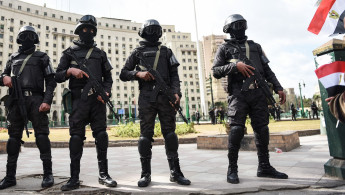Egypt’s iconic Tahrir Square to be closed for ‘renovation’ following anti-Sisi protests
Cairo’s iconic Tahrir Square is to be closed for two months for “renovation and beautification” works, a source at the Egyptian Ministry of Housing told the New Arab on Friday.
The square became famous around the world in the early days of the 2011 Arab Spring, when a revolution which brought down former Egyptian dictator Hosni Mubarak broke out there.
Egyptian Housing Minister Assem al-Jarar said that Tahrir Square would be transformed into a touristic and archaeological site, as part of plans by the Egyptian government to “develop Cairo’s heritage”.
Read more: Whistleblowers, repression, and regime panic will fuel Egypt’s next uprising
He added that an obelisk of Ramses II would be transported from Egypt’s Sharqiya province northeast of Cairo to the square, and that palm and olive trees would be planted in order to beautify it. Advertising billboards blocking the view of heritage buildings would also be removed from the square.
However, the minister’s announcement comes at a time when Tahrir Square is under an unprecedented security lockdown.
Last month, Egyptian businessman Mohamed Ali made a series of videos revealing that President Abdel Fattah al-Sisi had contracted his construction company to build several luxurious palaces for himself and his family at a time when the Egyptian government was imposing harsh austerity measures on the population.
The scandal has been dubbed “Palacegate” by analysts. Sisi did not deny building the palaces but said that he was building them for the Egyptian state, rather than himself, adding that he would continue to “build and build and build”.
Thousands of people protested against Sisi in Tahrir Square in September in response to Mohamed Ali’s videos.
The Egyptian government responded with a campaign of repression that has been denounced by human rights groups. Thousands of activists have been arrested.
Tahrir Square is located near several important government buildings, including the prime minister’s office, the Egyptian parliament, and the Ministries of Justice, Education, and Supply.
Pedestrian and vehicle traffic will be re-routed away from the square as a result of the renovation. It is believed that the decision to close off and “beautify” the square is to forestall any possibility of protest and remove it as a symbol of revolution and dissent.
Follow us on Twitter: @The_NewArab





 Follow the Middle East's top stories in English at The New Arab on Google News
Follow the Middle East's top stories in English at The New Arab on Google News


